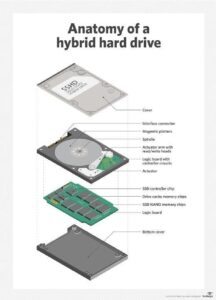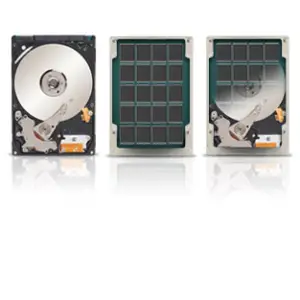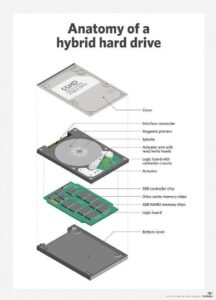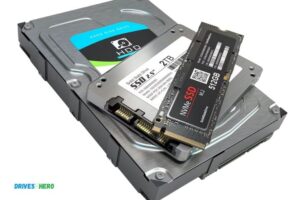Solid State Hybrid Drive Vs Ssd
Solid State Hybrid Drives (SSHDs) have been around for a while now, but they are still often misunderstood. Many people think that an SSHD is just a regular hard drive with a small amount of flash memory added to it, but that’s not quite accurate. In this post, we’ll take a look at what SSHDs are and how they differ from traditional hard drives and pure SSDs.
Solid State Hybrid Drive (SSHD) vs. Solid State Drive (SSD): Which is Faster?
When it comes to speed, there is no doubt that SSDs are faster than HDDs. But what about SSHDs?
How do they compare to SSDs in terms of speed?
To answer this question, we need to take a look at how each type of drive works. Hard drives work by storing data on spinning disks.
These disks are read and written to by a head that moves back and forth across the disk surface. The faster the disk spins, the faster the head can access the data.
Solid state drives also store data on chips, but these chips are not accessed in the same way as with hard drives.
With an SSD, data is stored in blocks instead of tracks like on an HDD. This means that an SSD can access any block of data at any time without having to wait for the head to move into position. As a result, SSDs are much faster than HDDs when it comes to reading and writing data.
So, what about SSHDs? As you might expect, they fall somewhere in between SSDs and HDDs in terms of speed. An SSHD combines a traditional hard drive with a smaller amount of flash memory (usually 4GB to 8GB).
This flash memory acts as a cache for frequently-accessed files so that they can be quickly retrieved from the hard drive without having to spin up the disks each time. This results in faster performance than an HDD alone, but not as fast as an SSD since the hard drive still needs to be accessed for most files.
Hybrid Drive Vs Ssd Gaming
The debate over which is better for gaming, a hybrid drive or SSD, has been going on for some time. There are pros and cons to each type of drive, so it really depends on what you value most in a gaming experience. Here’s a breakdown of the key differences between hybrid drives and SSDs to help you make a decision:
Hybrid Drives:
+ More affordable than SSDs
+ Generally offer more storage space than SSDs
– Can be slower than SSDs (especially when it comes to boot times)
SSDs:
+ Much faster than hybrid drives (particularly when it comes to boot times)
+ Provide a smoother gaming experience overall thanks to quicker load times between levels/maps etc.
Sshd Vs Ssd Vs Hdd
There are three types of storage devices commonly used in computers: SSDs, HDDs, and SSHDs. Each has its own advantages and disadvantages that make it better suited for different tasks. Here’s a look at how each type of storage device stacks up:
SSD (Solid State Drive): Advantages: – Faster than both HDD and SSHD; typically boot up and load programs much quicker
– More durable since there are no moving parts; less likely to be damaged if dropped or jostled around – Low power consumption means longer battery life on laptops Disadvantages:
Hdd Vs Ssd
The solid state drive (SSD) is the clear winner when it comes to speed, but it comes at a cost. A hard disk drive (HDD) is cheaper and offers more storage space, but it’s not as fast as an SSD. So, which one should you get?
It depends on your needs.
Here’s a closer look at the differences between HDDs and SSDs:
Speed: SSDs are much faster than HDDs.
They can boot up your computer in seconds, whereas HDDs can take minutes. This is because SSDs have no moving parts, so they can access data much quicker than HDDs.
Price: SSDs are more expensive than HDDs per gigabyte of storage.
For example, a 1TB HDD might cost $50, while a 1TB SSD might cost $200. However, prices are dropping all the time, so this difference may not be as big in the future.
Storage capacity: HDDs typically have larger storage capacities than SSDs.
For example, you might be able to find an HDD with 2TB of storage space, whereas most SSDS only go up to 1TB. If you need lots of storage space, then an HDD is the better option. However, if you don’t need that much space, then an SSD will be fine – and it will be faster too!
Are Hybrid Drives Worth It
The Pros and Cons of Hybrid Hard Drives
When it comes to hard drives, there are three main types: traditional hard disk drives (HDDs), solid state drives (SSDs), and hybrid hard drives (HHDs). All three have their own advantages and disadvantages, but HHDs seem to be the best of both worlds.
Here’s a look at the pros and cons of hybrid hard drives:
Pros:
1. Increased Storage Capacity
One of the biggest advantages of HHDs is that they offer increased storage capacity. This is because they combine the best features of both HDDs and SSDs. HDDs are great for storing large amounts of data, but they’re not very fast.
SSDs are much faster, but they can’t store as much data. HHDs bridge the gap between these two extremes by offering a larger storage capacity than SSDs while still being faster than HDDs.
2. Faster Data Access Speeds
Another advantage of HHDs is that they offer faster data access speeds than HDDs. This is because HHDs use a technology called “cacheing” which stores frequently accessed data in a special area on the drive where it can be quickly retrieved. This significantly speeds up the process of accessing files, which can be important when you need to open or save large files quickly.
Cacheing is also used on SSDs, but HHDs tend to do it more effectively due to their larger storage capacity.
Best Sshd
SSH (Secure Shell) is a network protocol that allows data to be exchanged between two computers in a secure way. SSH uses public-key cryptography to authenticate the remote computer and allow it to access the shell of the local computer.
SSH was originally designed as a replacement for Telnet, which does not provide any security features.
However, SSH has now become the standard way to access remote shells on Linux and Unix systems. It is also commonly used to securely transfer files between computers.
The best way to use SSH is with a program called an SSH client.
This program will connect to an SSH server and allow you to run commands or transfer files. There are many different SSH clients available, but we recommend using PuTTY if you are running Windows or OpenSSH if you are running Linux or Unix.
Once you have installed an SSH client, you can connect to an SSH server by running the following command: ssh [email protected]
This will connect you to the server at example.com using the username “bob”. You will then be prompted for your password.
Is Hybrid Drive Better Than Ssd?
Is hybrid drive better than SSD? This is a difficult question to answer because it depends on what you mean by “better.” If you’re talking about raw speed, then SSD is definitely the winner.
However, if you’re talking about overall performance, then it’s a bit more complicated. Here’s a look at the pros and cons of each type of drive to help you make your decision.
SSD Pros:
– Much faster than traditional hard drives
– Low power consumption
– No moving parts means less heat generation and less chance of failure
– More rugged and resistant to shock and vibration
– Silent operation
SSD Cons:
– More expensive than traditional hard drives (although prices are dropping all the time)
– Lower capacity than traditional hard drives (although this is also changing as technology improves)
HDD Pros:
– Cheaper per gigabyte than SSDs
– Higher capacities available
HDD Cons:
– Slower than SSDs
– Requires more power to operate
Which is Better Sshd Or Ssd?
Solid State Drives (SSDs) and Serial Attached SCSI (SAS) hard drives are both incredibly fast storage solutions, but which one is better for your needs? Here’s a look at the key differences between SSDs and SAS drives to help you decide.
Speed: SAS drives offer higher data transfer rates than SSDs, so they’re better suited for applications that require fast data access.
However, SSDs are faster when it comes to random access times, so they’re better for applications that require quick loading times.
Capacity: SAS drives typically have larger capacities than SSDs, so they’re a good choice if you need to store a lot of data. However, SSDs are available in larger capacities than ever before, so they can still meet your storage needs.
Reliability: Both SSDs and SAS drives are very reliable, but SAS drives tend to be more durable since they don’t have any moving parts. This means that SAS drives can withstand more wear and tear and are less likely to fail over time.
Are Solid-State Hybrid Drives Good?
Solid-state hybrid drives (SSHDs) are a type of hard drive that combines the best of both worlds: the speed of a solid-state drive (SSD) and the capacity of a traditional hard disk drive (HDD).
An SSHD contains both an SSD and an HDD, which work together to provide faster data access than an HDD alone. The SSD portion of the SSHD is used as a cache, storing frequently accessed data so that it can be quickly retrieved by the computer.
The HDD portion provides additional storage space for less frequently accessed data.
One benefit of an SSHD over an SSD or HDD alone is that it is more affordable than purchasing two separate drives. Additionally, SSHDs typically have longer lifespans than HDDs due to their lower write speeds and increased reliability.
So, are solid-state hybrid drives good? In general, yes! They offer many benefits over standard hard drives, including increased speed and reliability at a lower cost.
What is Solid-State Hybrid Drive?
A solid-state hybrid drive (SSHD) is a data storage device that combines a traditional hard disk drive (HDD) with a solid-state drive (SSD). The SSD portion of the SSHD typically contains a small amount of flash memory, which is used as a cache to improve performance. When data is written to the SSHD, it is first stored in the flash cache.
Once the data has been cached, it is then written to the HDD. This approach can help to improve overall performance, since write operations are typically much faster on SSDs than HDDs.
One thing to keep in mind with SSHDs is that they typically have lower capacity than pure SSDs.
This is because the HDD portion of the device still needs to be large enough to store all of your data. However, if you don’t need a lot of storage space, an SSHD can be a good option for improving performance without breaking the bank.
Conclusion
The debate between whether to use a solid state hybrid drive (SSHD) or a pure SSD has been raging for years now. The main difference between the two is that an SSHD contains a small amount of flash memory on top of a regular hard drive, while a SSD is entirely flash based. So, which one should you use?
The answer, as with most things in life, is it depends. Both have their pros and cons that need to be considered before making a decision. Let’s take a look at those now.
Solid State Hybrid Drive Pros:
– More affordable than SSDs
– Greater capacity than SSDs (usually 2-4TB)
– Faster than traditional HDD drives
Solid State Hybrid Drive Cons:
– Not as fast as an SSD
– susceptible to the same issues as HDDs ( fragmentation, data loss)
Now let’s look at SSDs.
Pure Solid State Drive Pros:
– Much faster than any other type of storage
– More reliable than HDDs
– Uses less power which can extend battery life on laptops
Pure Solid State Drive Cons:






